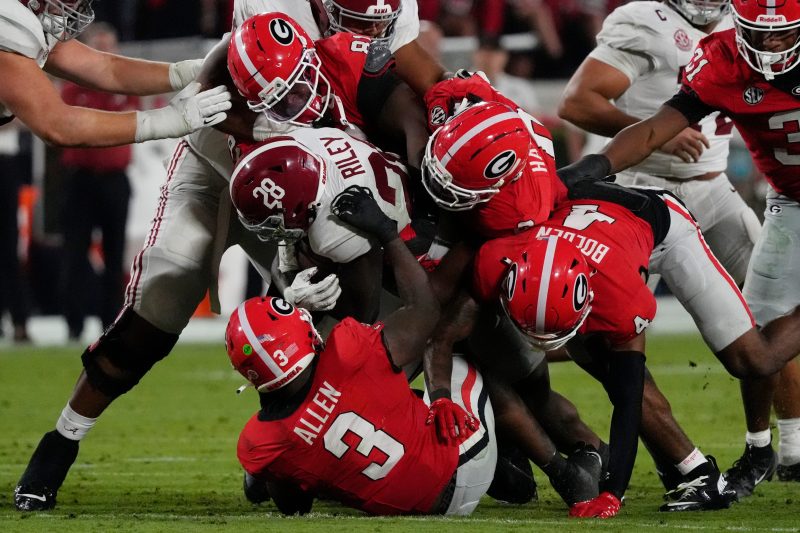The SEC is concerned the College Football Playoff selection committee is not prioritizing strength of schedule as promised.
A potential scenario where the SEC runner-up is left out of the 12-team playoff could cause major conflict.
Tensions are also rising between the SEC and Big Ten over future playoff formats and conference scheduling.
The SEC and Big Ten have made stunning moves over the past five years to dramatically mold college football into their preferred image.
What they can’t do is control the human condition on the College Football Playoff selection committee.
And that may just lead to more stunning moves from the SEC to change the sport forever.
Because the day the runner-up of the SEC isn’t selected to the CFP, is the day the SEC walks out of the entire process.
A selection process the SEC was promised would change, where strength of schedule and big wins, and to a lesser extent, close losses in big games, would be the high-value entry point.
Three weeks into the latest iteration of the CFP poll, it’s clear those promises haven’t been kept.
“That simply didn’t happen,” said Missouri coach Eli Drinkwitz.
You want a nightmare scenario for the SEC, and the rest of college football, by proxy? Here it is:
No. 10 Alabama beats Auburn, advances to the SEC championship game, loses to either No. 3 Texas A&M or No. 4 Georgia (which it already beat this season, in Athens), and drops out of the 12-team CFP.
Behind Notre Dame, which lost to Texas A&M at home. Behind Miami, which won’t even have played in its conference championship game — much less, the ACC championship game.
The 16 SEC presidents would get on the horn to commissioner Greg Sankey, and the fallout would be catastrophic for the future of college football.
A scenario like that — which isn’t that far from unfolding — would force the SEC into fight or flight, to take its ball and go home with its television partner (ESPN) that runs the sport, and start an SEC-only playoff.
It’s not like they haven’t threatened to do so before. In fact, Sankey defiantly said not long ago that it wasn’t a threat.
In other words, we’ll do it.
Look, the SEC has played a role in the sport’s dramatic change, and must take its fair share of blame for some of the chaos playing out on and off the field. Expansion, contraction, player empowerment and free player movement with unbridled NIL free agency. They must own it.
But the most popular and competitive conference in all of college sports has yet to truly flex its muscle. It still hasn’t played the final, undeniably devastating card it holds.
Sankey hasn’t said as much, and won’t when asked. He’ll do what he should, and say we’ll let the committee do its work and hope they use the new metrics they were given to begin the season.
You know, the proper response — so it doesn’t look like he’s trying to influence the committee. But that hammer is waiting to fall.
Because after the SEC was told the new metrics would be used, the league in August moved to a nine-game conference schedule. Because the Big Ten and Big 12 were already there, and the ACC was moving there, too ― and the SEC opted to put everyone on the same level of play.
Even though they clearly aren’t.
But the SEC acquiesced, and they moved forward believing the Big Ten would then return the favor by agreeing to a 5+11 model (five automatic qualifiers, 11 at-large) for the 16-team format beginning in 2026. Only the Big Ten hasn’t.
In fact, we’re mere days from ESPN’s deadline of Dec. 1 to change the format for 2026 and beyond, and the Big Ten is still pitching outrageous ideas. One, a 24-team playoff.
So what exactly is the SEC supposed to do?
Roll into 2026 with a nine-game conference schedule, intentionally making it more difficult to reach the CFP? Do so knowing the CFP hasn’t used the metrics they were given, and preventing the SEC from absorbing more playoff-changing losses?
And do so knowing they will never, ever change the human condition ― because no one in the history of the planet has.
“I was the first one to say in our meetings going to nine games made no sense,” said Kentucky coach Mark Stoops. “Everyone outside of our league, of course they wanted us to. But it made no sense for us to do so.”
Now the SEC is staring at another paradigm moment in the evolution of the sport, just a couple weeks from announcing the week-by-week 2026 schedule that includes nine conference games.
For now, anyway.
Because if the nightmare scenario of the SEC runner-up missing the CFP unfolds, all options are on the table.
Including the SEC taking their ball and going home.
Matt Hayes is the senior national college football writer for USA TODAY Sports Network. Follow him at @MattHayesCFB.











